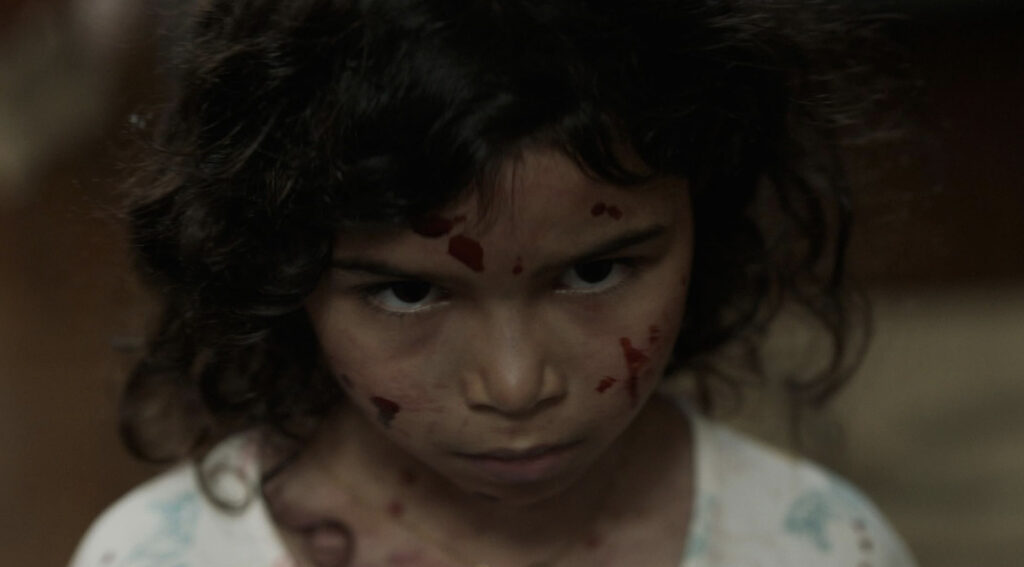“Birth/Rebirth” is a Feminist Take on “Frankenstein” and “Pet Sematary”

The act of childbirth can be an awe-inspiring miracle. It can also be a body horror nightmare. Not only does every single thing about your physiology change, but the mental toll of loving and caring for another human being can be exhausting as well. Death is equally mysterious. Though we can now deduce the causes and mechanics of ceasing to be alive, we often have just as little control over the ending of life as we do the creating of it. Laura Moss’s new film Birth/Rebirth explores the connections between these mysterious powers in a story that blends Mary Shelley’s Frankenstein with Stephen King’s Pet Sematary. This dark and devastating film explores the horrors that follow when a body you love becomes swallowed by a cruel and unpredictable world.
Birth/Rebirth opens with a horrific delivery. A pregnant woman is rushed to the emergency room well before her due date and dies on the operating table while her doctors divert their attention to the premature newborn who will now grow up without a mother. This dark scene perfectly sets the tone for a film in which motherhood is a dangerous act. We then meet Celie, (Judy Reyes) a busy nurse and single mom desperate to make ends meet. Hurrying to work, she hands her young daughter Lila (A.J. Lister) off to a neighbor and powers through her shift only to return home and find that Lila has died of viral meningitis. Adding insult to injury, the hospital loses possession of her body–the precious collection of tissues and cells Celie grew inside of her own.
While Celie suffers through these horrors, a morgue technician named Rose (Marin Ireland) experiences her own nightmarish gestation. Collecting semen from a stranger in a bar bathroom, she goes through the motions of this conception then coldly gets back to her lonely life of illicit scientific research. As the stories of these two women converge, they find themselves working together to resurrect Lila’s body and find that the cost of this miracle may be more than they can pay. What begins as an altruistic experiment to defeat death takes a dark turn as the rebirth of one child is pitted against the birth of another.
Moss’s film has been described as a feminist take on Frankenstein. Rose and Celie both try to restore life to living flesh and wind up with a monster they cannot control. Though Lila spends most of the film in bed, her silent stares feel ominous considering how much time this young child has spent beyond the veil of death. Where Victor Frankenstien assembles male body parts of different corpses to piece together his monster, Rose uses her own body’s ability to reproduce and the fruits of conception to spark life in her undead experiments. Rose’s story does feel deeply indebted to Shelley’s foundational text. However, Celie’s story mirrors Stephen King’s Pet Sematary, a cautionary tale about the horror of parental devotion. While Rose simply wants to use her own body to restore life, Celie wants to turn back the clock on an unimaginable tragedy. Like Louis Creed, she dives into the unthinkable on the slim chance that her daughter will return to her and winds up losing her own humanity in the process.
Birth/Rebirth is also a cautionary tale. Moss’s harrowing story warns us not to play with the fire of unconsidered scientific advancements while honoring the sacrifices needed to create life. Both women approach motherhood from opposite ends of a wide spectrum, validating the vast array of feelings that accompany the ability to give birth. Celie’s life revolves around caring for others and she gives up everything to recapture her life as a mother. Rose has built her own life around her work which heavily depends on her body’s ability to conceive. When overuse of her reproductive system threatens her health, she mourns her hysterectomy like Celie mourns the loss of her child.
Birth/Rebirth is a story told by, for, and about women. Other than an unseen lab tech, a hapless husband, and an unwitting sperm donor, the film revolves around two women wrestling with the uncontrollable nature of reproduction. While many films have explored the particular brand of body horror that is childbirth, few present the brutality of birth through such an isolating lens. Those who have lost children or pregnancies may feel triggered by realistic depictions of these devastating life events. Others will feel seen and validated by the unflinching eye Moss turns toward the messy act of motherhood. Birth/Rebirth is an honest and necessary story about the lengths some will go to bring life into the world and what others will give up to sustain it.
Jenn Adams is a writer, podcaster, and film critic from Nashville, TN. Find her social media nonsense @jennferatu.